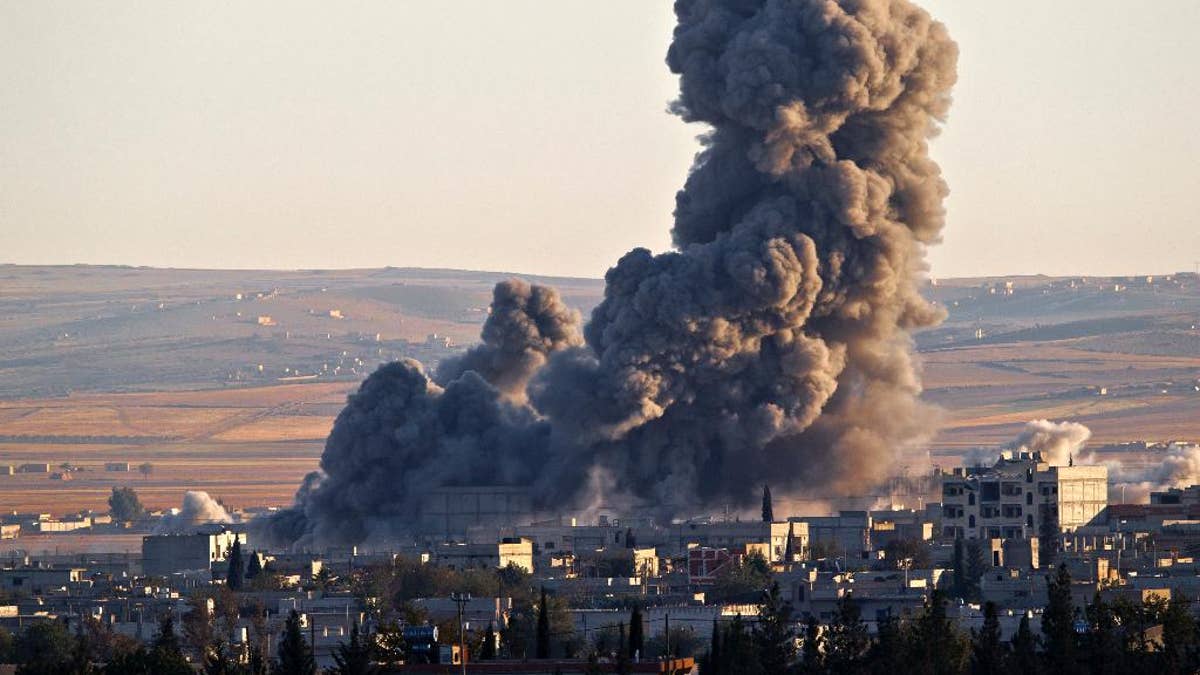
Nov. 8, 2014: Smoke rises from an Islamic State position in eastern Kobani, after an airstrike by the US led coalition, seen from a hilltop outside Suruc, on the Turkey-Syria border Saturday . Kobani, also known as Ayn Arab, and its surrounding areas, has been under assault by extremists of the Islamic State group since mid-September and is being defended by Kurdish fighters. (AP)
BEIRUT – U.S.-led coalition airstrikes against the Islamic State group and other extremists in Syria have killed more than 860 people, including civilians, since they began in mid-September, a monitoring group said Wednesday.
The Britain-based Syrian Observatory for Human Rights said the vast majority of those killed -- 746 people -- were Islamic State militants, while another 68 were members of Al Qaeda's Syrian affiliate known as the Nusra Front. At least 50 civilians, including eight children and five women, also have been killed in the airstrikes, the group said.
In Baghdad on Wednesday, Prime Minister Haider al-Abadi shook up the country's military, relieving 26 army officers from their command, retiring 10 others and appointing 18 new commanders.
A statement posted on the official website of the prime minister's office said the changes were ordered "as part of efforts to reinforce the work of the military on the basis of professionalism and fighting graft in all its forms."
The statement did not elaborate, but a government official said the shake-up followed the findings of a probe carried out by an investigator appointed last month by al-Abadi on corruption in the military.
Under Iraq's constitution, al-Abadi, like Nouri al-Maliki before him, holds the post of General Commander of the Armed Forces. But it was al-Maliki, now a vice president, who had tightly controlled the military during his eight-year rule, with several elite units taking their orders directly from him.
Al-Abadi's move comes as Iraq's military and security forces, aided by the coalition's airstrikes, battle militants from the Islamic State group on a multitude of fronts to drive them out of about a third of the country they seized in a summer blitz. The army and security forces had melted away in the face of the onslaught but have since partially regrouped.
The U.S.-led coalition's aerial campaign in Syria began before dawn on Sept. 23 in what President Barack Obama has called an effort to roll back and ultimately destroy the Islamic State group. The militant extremist group has been the primary target of the coalition's strikes, although on at least two occasions the United States has targeted what it says is a specific cell within the Nusra Front allegedly plotting attacks against American interests.
The airstrikes in Syria expanded upon a U.S.-led operation in neighboring Iraq against the Islamic State group, which has seized control of a large chunk of territory spanning the two countries.
In Iraq, government security forces and Shiite militias have largely halted the militants' advance, even rolling them back from some areas with the help of coalition airstrikes. But heavy fighting still rages on multiple fronts, and attacks on government troops and civilians remain common, particularly in Baghdad.
On Wednesday, three bombings in and around the Iraqi capital killed at least 17 people and wounded nearly 40, police and hospital officials said. There was no immediate claim of responsibility for the attacks, but they all bore the hallmarks of the Islamic State group.
The deadliest bombing took place in the turbulent Youssifiyah district south of Baghdad, where a suicide car bomber hit an army checkpoint, killing six soldiers and wounding 16 people, including 10 civilians.
Earlier in the day, a car bomb near a cluster of shops in Baghdad's upscale Mansour district killed six civilians and wounded 13. Minutes later, a suicide bomber blew himself up at the entrance of a nearby police station as officers were rushing out to the site of the first attack, killing five policemen and wounding 10.
Elsewhere in Iraq, government forces backed by Shiite militiamen are facing tough resistance from Islamic State fighters in the refinery town of Beiji, a day after they pushed militants out of the town center, said a senior military official reached there by telephone.
The official said reinforcements have reached Beiji, 155 miles north of Baghdad, to protect areas of the town now under government control. However, booby-trapped houses and roadside bombs were hindering their advance toward the northern and northwestern parts of the town, where Iraq's largest refinery is located.
All officials spoke on condition of anonymity because they were not authorized to speak to the media.
Lifting the siege of the refinery, which sits inside a sprawling complex with a capacity of some 320,000 barrels a day -- a quarter of Iraq's refining capacity -- was likely the next objective in the campaign to rid Beiji of the militants.
When fully retaken, the strategic town will likely be a base for staging a push to take back Saddam Hussein's hometown of Tikrit, which was overrun by the extremists last summer.
